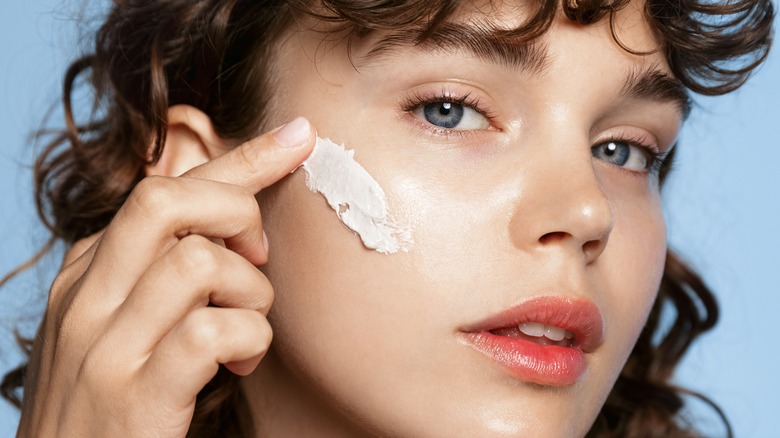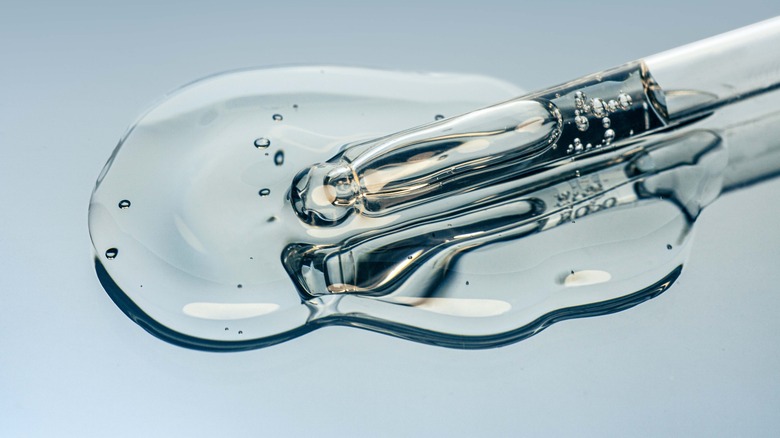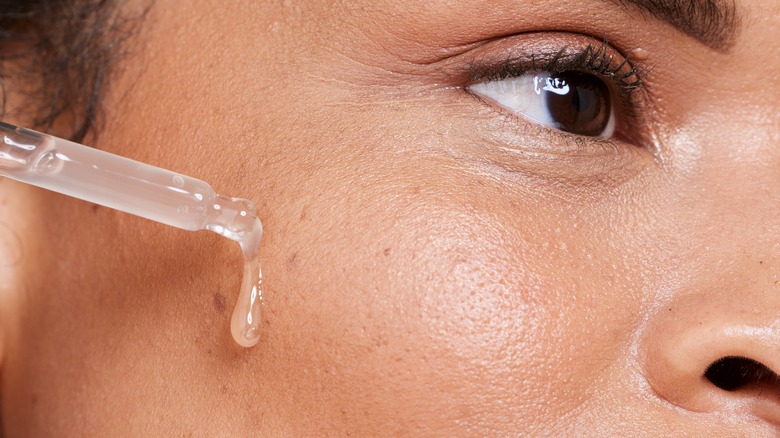Skincare Ingredients To Look For If You're Going Retinol-Free
The anti-aging miracle ingredient retinol has been all the rage ever since it became commercially available, and it's all thanks to its long list of benefits. The popular product, which is a derivative of vitamin A, has been lauded for its ability to accelerate collagen production and cell turnover, resulting in a clearer, smoother, and brighter complexion. It can also reduce the appearance of fine lines, wrinkles, and pigmentation, lighten acne scars, improve the skin's texture, and unclog pores.
But while retinol can single-handedly do what would normally require several products, the potent ingredient isn't for everyone, especially those whose skin is extra sensitive and reactive. "Need is subjective" when it comes to retinol use, Dr. Paul Jarrod Frank, a dermatologist, told Harper's Bazaar. "I don't think anyone needs it, but there are people that can benefit from it," he said, noting that those with sensitive skin may benefit from using something else instead. "If you have rosacea, psoriasis, or are eczema-prone, then retinols are not really for you," he added.
The good news is that you're not missing out on a lot if your skin is intolerant to retinol. Considering that the ingredient is incredibly potent and can often cause redness and itchiness if misused, dermatologist Dr. Marisa Garshick told InStyle that a growing number of people with sensitive skin rely on retinol alternatives instead. "People are more aware of the importance of the skin barrier and recognize we don't want the skin to be irritated, red, and flaky," she said, noting that there are tons of retinol dupes that are "gentle and less irritating on the skin [and] allow for better tolerability."
Make bakuchiol and niacinamide your best friends
First retinol alternative on the list? You may want to check out bakuchiol, which is derived from the babchi plant and is wildly popular in both Ayurvedic and traditional Chinese medicine. Dermatologist Dr. Jordan C. Carqueville shared with Today that it delivers similar effects as retinol in terms of facilitating collagen production, alleviating the appearance of wrinkles, and exfoliating the skin's topmost layer. "When you use topicals like these, you stimulate these cells to become alive again," he said. "That means that you're growing new cells, and your skin is supple and tighter. It helps to reduce photodamage as well because you're stimulating those cells."
Niacinamide is another suitable option, and it's probably an ingredient you already use anyway. Dr. Ellen Marmur told PopSugar that aside from helping your skin retain moisture, the vitamin B3 derivative "increases natural lipids on the skin and reduces water loss, thereby reducing pore size. It can also improve skin texture."
Peptides are apparently great retinol alternatives, too, with Dr. Claire Chang telling PureWow that they "reduce signs of aging and photodamage, including pigmentation, fine lines and wrinkles, as well as improve skin hydration." In terms of specific peptides, she noted, "There are several types of peptides used in skincare — all of which serve different functions. Signal peptides stimulate new collagen and elastin growth, while enzyme-inhibitor peptides block the enzymes that break down collagen in the first place. There are also carrier peptides, which deliver minerals to the skin and aid in wound healing and other enzymatic processes, whereas neurotransmitter-inhibiting peptides may work similarly to Botox to reduce wrinkle formation."
When to use retinol alternatives
Aside from folks with hyper-sensitive skin, pregnant people and those who are breastfeeding are also urged to resort to retinol alternatives. Apparently, retinoids can cause birth defects, and while there is still no clear evidence that suggests that topical retinoids produce the same effect, experts still advise against using them. "We know that ingredients applied to the skin have the potential to be absorbed into the bloodstream and passed to the baby through the placenta," Dr. Blair Murphy-Rose shared with Verywell Family.
And even if you don't have sensitive skin but hate the burn caused by constant retinol use, you can also opt for alternatives. Dr. Shereene Idriss told Brides that you can tell you have retinol burn if your skin is redder and more inflamed than normal, and if you are "experiencing breakouts or inflamed acne that is not usual for your skin." She noted that when it comes to retinol, your "skin is going to be more-and-more raw, more irritated, and more 'angry,' whereas other skin conditions don't necessarily have those symptoms."


